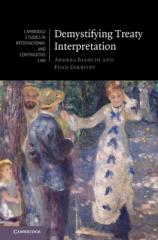Demystifying Treaty Interpretation doesn't just tell you how treaties are commonly interpreted. It helps you understand also the process of treaty interpretation and its outcomes. The idea that rules of treaty interpretation can guide us to the meaning of treaty provisions, in a simple and straightforward manner, is a myth to be dispelled. This book aims to capture some of the complex and nuanced processes involved in treaty interpretation. It spurs further reflection about how interpretation takes place against the background of concepts, categories, and insights from other disciplines. A useful tool for scholars, practitioners and researchers engaging with treaty interpretation at all levels, the book aims to enhance the reader's knowledge and mastery of the interpretive process in all its elements, with a view to making them more skilled and effective players in the game of interpretation.
Read more
1. The province of the rules of treaty interpretation; 2. The Interpreter's Self: Freedom and Constraints; 3. The Genealogy of the Contemporary Regime of Treaty Interpretation; 4. Textualism: Its Unfulfilled Promises and Unintended Consequences; 5. Intentionalism: A Lost Cause?; 6. What's the Purpose of 'Object and Purpose'?; 7. Supplementary Means: A Dangerous Supplement?; 8. The magic of systemic integration; 9. Inferential Reasoning and Its Consequences; 10. Time and Treaty Interpretation; 11. Text, Author, and Interpretive Control; 12. Power, Persuasion, and Authority; Index.
Read more
Helps the reader better understand what it is that international lawyers do when interpreting a treaty.
Product details
ISBN
9781108708630
Published
2024-03-14
Publisher
Cambridge University Press
Weight
470 gr
Height
228 mm
Width
151 mm
Thickness
17 mm
Age
UP, P, 05, 06
Language
Product language
Engelsk
Format
Product format
Heftet
Number of pages
316


